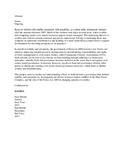| dc.description.abstract | Status:
Ongoing
Kenya is riddled with conflict associated with instability, as evident inthe widespread violence after the national elections 2007. Much of the violence took place in rural areas, where conflict and competing claims over natural resources appear closely entangled. The underlying drivers of conflict and violence remain contested and poorly understood. Solving or mediating these may comprise an important contribution to the building of a more stable Kenya empowered to support development for and bring prosperity to its populace.
In search of stability and prosperity, the government of Kenya in 2005enacted a new Forest Act aimed at improving natural resources management by decentralizing responsibilities and rights of forest management to civil society bodies, called Community Forestry Associations (CFA). Such reforms can be seen as an exercise of State building through adherence to democratic principles, whereby State-led governance becomes inclusive in the sense that it recognizes civil society based governance. In practice, however, top-down State-led governance reforms often ignore or disrupt pre-existing civil society based governance processes, which leads to further conflict and destabilization.
This project seeks to further our understanding of how to build inclusive governance that furthers stability and prosperity by investigating the drivers of forest related conflicts in the Mau Forest Complex, and the role of the Forest Act 2005 in changing patterns of conflict.
Collaborators:
DANIDA
Start Month:
January
Start Year:
2012
End Month:
December
End Year:
2015 | en_US |


